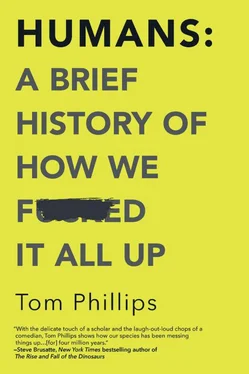Tom Phillips - Humans - A Brief History of How We F*cked It All Up
Здесь есть возможность читать онлайн «Tom Phillips - Humans - A Brief History of How We F*cked It All Up» весь текст электронной книги совершенно бесплатно (целиком полную версию без сокращений). В некоторых случаях можно слушать аудио, скачать через торрент в формате fb2 и присутствует краткое содержание. Город: Toronto, Год выпуска: 2019, ISBN: 2019, Издательство: Hanover Square Press, Жанр: История, Юмористические книги, на английском языке. Описание произведения, (предисловие) а так же отзывы посетителей доступны на портале библиотеки ЛибКат.
- Название:Humans: A Brief History of How We F*cked It All Up
- Автор:
- Издательство:Hanover Square Press
- Жанр:
- Год:2019
- Город:Toronto
- ISBN:978-1-48805-113-5
- Рейтинг книги:4 / 5. Голосов: 1
-
Избранное:Добавить в избранное
- Отзывы:
-
Ваша оценка:
- 80
- 1
- 2
- 3
- 4
- 5
Humans: A Brief History of How We F*cked It All Up: краткое содержание, описание и аннотация
Предлагаем к чтению аннотацию, описание, краткое содержание или предисловие (зависит от того, что написал сам автор книги «Humans: A Brief History of How We F*cked It All Up»). Если вы не нашли необходимую информацию о книге — напишите в комментариях, мы постараемся отыскать её.
Humans: A Brief History of How We F*cked It All Up — читать онлайн бесплатно полную книгу (весь текст) целиком
Ниже представлен текст книги, разбитый по страницам. Система сохранения места последней прочитанной страницы, позволяет с удобством читать онлайн бесплатно книгу «Humans: A Brief History of How We F*cked It All Up», без необходимости каждый раз заново искать на чём Вы остановились. Поставьте закладку, и сможете в любой момент перейти на страницу, на которой закончили чтение.
Интервал:
Закладка:
Upon realizing that his entire army was twatted, Cecil took the reasonable decision to abandon the plan entirely, and ordered his men to retreat to the ships and slink home in shame. Most of them did, eventually, but about 1,000 were so drunk that they just stayed lounging around Cádiz until the Spanish forces turned up and executed them all.
And that’s how England failed to invade Cádiz.
The English exploits in Cádiz often appear on lists of history’s greatest military failures—but to be entirely honest, if you ignore the bit about people being executed, it actually sounds pretty great. Turn up, don’t eat enough, get riotously pissed and lose a couple of your mates along the way: that’s a classic holiday. If instead of having wars, we just sent large groups of people to each other’s countries to drink loads of their wine and aimlessly wander around their towns on a regular basis, then the world would probably be a much, much happier place. Although now I’ve written that, it occurs to me that’s essentially what the EU is.
Alcohol, you’ll be astonished to learn, plays a leading role in a number of the dumbest moments to have graced the battlefield—as is the case with the Not-Really-a-Battle of Karansebes in 1788. This was impressive for the way the Austrian army managed to suffer heavy losses in battle despite the fact that their opponents never even turned up. In fact, their enemy (they were fighting the Ottoman Empire at the time) didn’t actually know the battle had happened until they came across the aftermath a little while later.
Exactly what happened is, uh, somewhat murky. What’s fairly clear is that the Austrian army was retreating at night through the town of Karansebes (in modern-day Romania), keeping a wary eye out for the pursuing Turks. At this point, accounts of the incident diverge. In one telling, a unit of local troops from the Romanian region of Wallachia started to spread rumors that the Turks had arrived, in order to cause confusion so they could loot the baggage train. In another telling, a group of cavalry officers met a Wallachian farmer with a cartload of brandy and decided they’d had a long, hard day’s riding and deserved some downtime. After a while, a group of infantry turned up and pointedly inquired whether the cavalry were planning on sharing the brandy with their foot-soldier brethren, at which point things got… rowdy.
Whatever the cause (the divergent tales have the definite ring of every unit of the army trying to blame another unit of the army), most sources seem to agree that things come to a head when somebody fires a shot into the air, and then somebody else starts shouting, “The Turks, the Turks!” The (quite possibly drunk) cavalrymen think it’s serious, and so naturally they start riding around shouting, “The Turks, the Turks!” as well. At which point everybody panics like fuck and starts trying to flee from the imaginary Turkish forces. In the darkness and confusion and probably drunkenness, two columns of troops cross each other, both mistake the other for the dreaded enemy and they begin firing wildly on each other.
By the time everybody has worked out that there aren’t actually any Turks attacking them, quite a lot of the Austrian army has run away, wagons and cannons have been overturned and the bulk of their supplies have been lost or ruined. When the Turkish army do turn up the next day, they discover a number of dead Austrians and the scattered remains of their camp.
Estimates of the losses vary quite dramatically. One source simply says “many” were dead and wounded; another says 1,200 were injured; while the Austrian leader Emperor Joseph II underwhelmingly claims in a letter that they lost “not only all the pots and tents… but also three pieces of artillery.” The most famous accounts of the battle put the death toll as high as 10,000, but that’s almost certainly a number some bloke invented to make the story sound better. In conclusion: something happened, some people may or may not have died, but everybody agrees that it was extremely stupid.
I think this is what’s referred to as “the fog of war.”
Another fine example of effectively managing to defeat yourself came during the Siege of Petersburg in the American Civil War, when the Union troops turned a tactical triumph into a humiliating setback in a particularly inventive way. They had Confederate forces pinned down in the fort, and spent a month preparing for the coup de grâce that would breach their walls in one dramatic maneuver, by digging a 500-foot mine shaft directly underneath the Confederate fort and planting an awful lot of explosives there.
When they blew up the wall in the early hours of the morning of July 30, 1864, the size of the explosion seems to have taken everybody by surprise. It killed hundreds of Confederate troops and left an enormous crater, 170 feet long and 30 feet deep. After about ten dazed minutes spent staring at it in shock, the Union forces attacked—although, unfortunately, they weren’t the troops who’d trained for days in the tactics they’d use to storm the fort once the wall was breached. That’s because the soldiers who’d been trained were black, and at the last minute the commander of the Union army instructed his underlings to swap them out for white soldiers because he was worried how it would look. And so the white troops rushed toward the Confederate position—and ran straight into the crater.
It’s possible they thought the crater would provide good cover. It didn’t. Once the Confederate soldiers had reorganized after the shock of the explosion, they found themselves surrounding a very large hole full of opponents who couldn’t get out. Union reinforcements kept on arriving, and for some reason decided to join their comrades in the crater. The Confederate commander later described it as a “turkey shoot.”
The key lesson in military tactics we can learn from this is: don’t walk into big holes in the ground.
Another essential lesson for any budding military strategists is that communication in wartime is vitally important. That’s something that the Pacific island of Guam learned during the Spanish–American war of 1898, when their colonial masters in Spain forgot to tell them that there was a war happening at all.
As a result of this oversight, when a small fleet of US warships steamed up to a suspiciously underdefended Guam and fired 13 shots at the old Spanish fort of Santa Cruz, Guam’s dignitaries reacted by rowing out to the battleships, thanking the Americans for the generous greeting salute and apologizing that it would take them a while to return the courtesy because they’d need to move their cannons over from another part of the island.
After a few awkward moments, the Americans explained that they hadn’t been saying hello, they’d actually been trying to have a battle, because there was a war on. The dignitaries, who were somewhat miffed to find they were now prisoners of war, explained they hadn’t received any messages from Spain in over two months and were completely in the dark about the whole war thing. They went off to have a bit of a debate about what to do, while one of the local merchants stuck around for a chat because it turned out he was an old friend of the American captain.
Guam officially surrendered a few days later, and has been an American territory ever since.
As a species, we’re not great at the “don’t repeat the mistakes of history” thing. But few examples are quite as glaring as the fact that in 1941, Hitler very precisely copied Napoleon’s fatal mistake from 129 years earlier, one which in both cases utterly screwed their previously quite successful plans to conquer all of Europe. That mistake, of course, was trying to invade Russia.
History’s only truly successful large-scale invasion of Russia—or rather Kievan Rus’, as Russia didn’t exist then—was by the Mongols, and they were fairly unique as these things go (as we’ll see in a few chapters). The Poles managed it for a short while (and even held Moscow for a couple of years) but were still ultimately driven back, while it went extremely badly for Sweden the one time they tried it, ending in a defeat that helped to effectively finish off the Swedish Empire. Basically, “don’t do it” is the lesson we’re learning here.
Читать дальшеИнтервал:
Закладка:
Похожие книги на «Humans: A Brief History of How We F*cked It All Up»
Представляем Вашему вниманию похожие книги на «Humans: A Brief History of How We F*cked It All Up» списком для выбора. Мы отобрали схожую по названию и смыслу литературу в надежде предоставить читателям больше вариантов отыскать новые, интересные, ещё непрочитанные произведения.
Обсуждение, отзывы о книге «Humans: A Brief History of How We F*cked It All Up» и просто собственные мнения читателей. Оставьте ваши комментарии, напишите, что Вы думаете о произведении, его смысле или главных героях. Укажите что конкретно понравилось, а что нет, и почему Вы так считаете.












